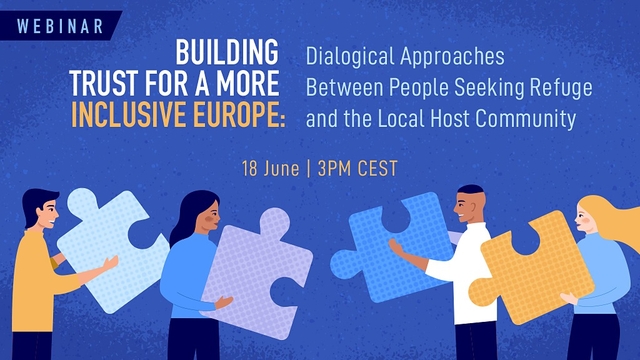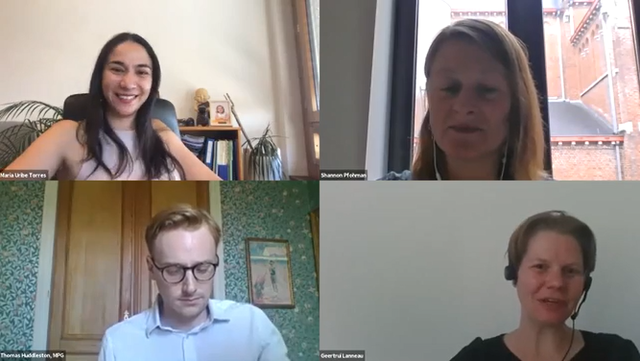
With the upcoming commemoration of the International World Refugee Day on sight, the International Dialogue Centre (KAICIID) organized on 18 June 2020 a webinar to discuss and explore ways to build trust to achieve a more inclusive society for people seeking refuge in Europe. The webinar was hosted by the Program of Social Inclusion of People Seeking Refuge in Europe and the Network for Dialogue.
Under the title “Building trust for a more inclusive Europe: dialogical approaches between people seeking refuge and the local host community” the discussion was moderated by Ms. Maria Lucia Uribe, Director of Arigatou International Geneva.
“Trust is a fundamental foundation of human relationships. It can reduce uncertainties and decrease vulnerabilities; it can support development and can help building more inclusive and just societies. Trust is a critical value in our life in community, particularly in our plural society,” stated Ms. Uribe in her opening remarks.
Populist tendencies throughout Europe have sparked fear in host societies, leading to distrust of refugees as well as hate speech and discrimination. During this webinar, panelists discussed how trust-building can be enhanced to build a more inclusive society for people seeking refuge in the continent.
The panel of speakers included key experts in the field of social inclusion and policymaking, namely Ms. Geertrui Lanneau, Senior Specialist on Labour Mobility and Human Development at the International Organization for Migration (IOM); Dr. Shannon Pfohman, Policy and Advocacy Director at Caritas Europa, and Dr. Thomas Huddleston, Migration Policy Group (MPG)’s Research Director.
Trust is a powerful force that builds loyalty, increases credibility, and supports effective dialogue. It gives the benefit of the doubt in situations where one wants to be heard, understood, and believed. It also allows people to feel safe and belong. The absence of trust can cause fragmentation, conflict and even war.
Under these premises, Dr. Thomas Huddleston shared policy insights that can be drawn from existing evidence and research on trust-building which can help foster the social inclusion of people seeking refuge in Europe. “We found that local intercultural policies that encourage the public to understand and mix with inmigrants are main drivers behind local wellbeing and attitude towards immigrants,” he explained.
Ms. Lanneau talked about the approaches taken by organizations working with people seeking refuge and local host communities in Europe to build trust between both sides. She pointed out that “integration is a two-way process that requires efforts and preparedness, not only on the part of the migrant but also a corresponding readiness on the part of the communities and public institutions to receive and welcome immigrants.”
Dr. Pfohman talked about the importance of dialogue to facilitate the process of trust-building concerning policymaking to foster more inclusive European societies. Dialogue facilitates the promotion of trust, thereby also building mutual understanding and connection. Dialogue and trust-building become inherently more important in a world which is divided due to the strengthening of populist, nationalist and xenophobic forces, especially in Europe.
“We believe that fostering dialogue and creating spaces of encounter can be a central factor for creating a true feeling of belonging, not only for the newcomer but also for the receiving community,” she stated.
She also shared about “Recipe book for integration,” an online toolkit developed by Caritas Europa to contribute to creating a culture of encounter towards fostering integration and more cohesive societies.
We thank KAICIID, the Program of Social Inclusion of People Seeking Refuge in Europe and the Network of Dialogue for organizing this event, and for inviting us to take part in these discussions. We also thank the attendants for their time and participation.
The recording of the webinar is available here.


